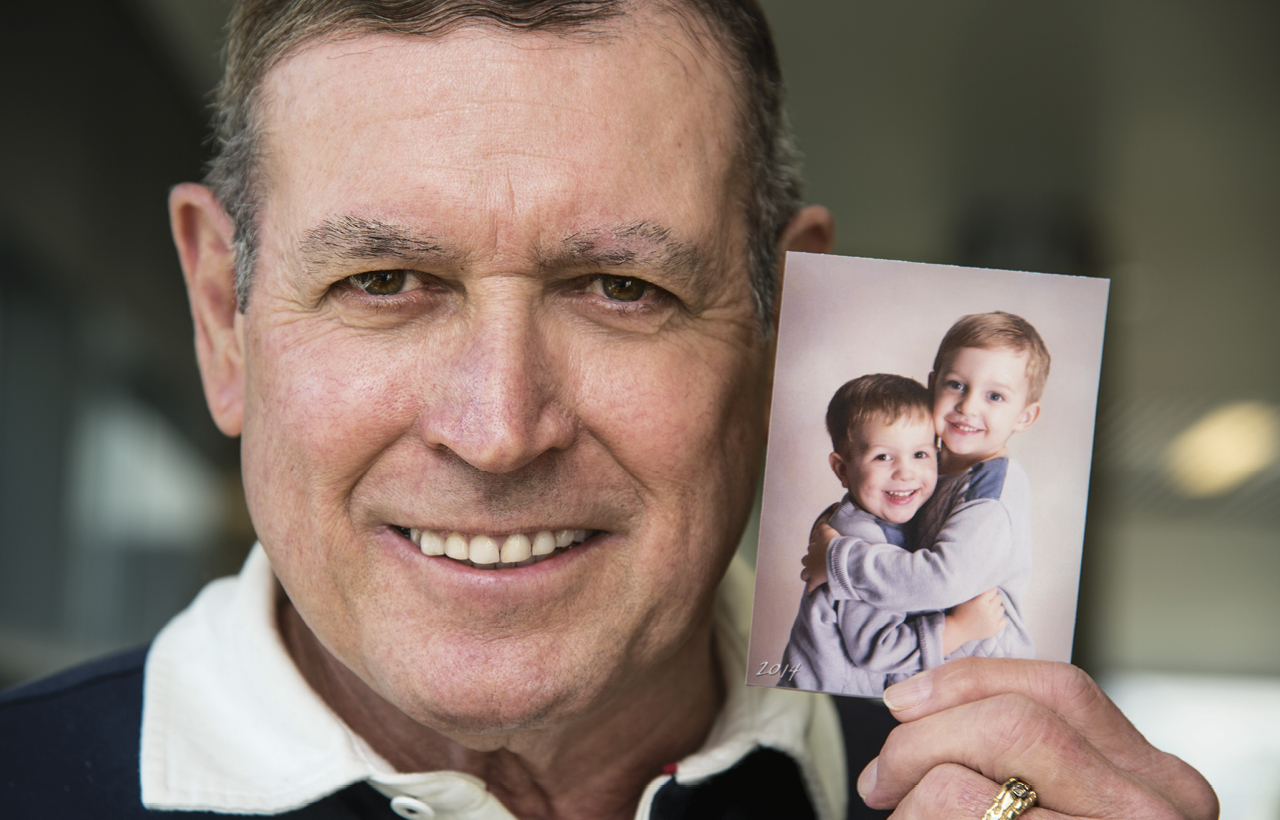
Banking on life
Patient Joe Banks thankful for care that’s ‘just right’
In 2011, two days before Joe and Barbara Banks were to leave for Tahiti to celebrate their 40th wedding anniversary, the retired Air Force colonel found out the lung cancer that had been in remission four years was back, it had spread, and he likely had six months to live, at best.
The non-smoker and self-described gym rat accepted that he would never meet his expected grandchild, and he said goodbye to family, including his pregnant daughter-in-law. But he also took the advice of his cancer center doctors and made an appointment to be evaluated for ongoing clinical trials. When he did, he entered a comprehensive system of care in which the cancer center’s Investigational Drug Service pharmacists play an essential role and for which he is grateful.
It turned out that Banks had a genetic mutation that made him eligible for a study led by oncologist Tianhong Li, associate professor of internal medicine. Li was the first to study the possible benefits of combining the chemotherapy drug, Alimta (pemetrexed), given intravenously, and the targeted anticancer therapy, Tarceva (erlotinib), taken orally.
“I began the treatment in April of 2011 and, by the fall of 2011, all the cancer was gone,” Banks says. “For me, it worked.”
Banks, who lives in Rescue, Calif., has since been taken off of the Alimta, but remains on a 21-day cycle of Tarceva. The drug can cause miserable side effects. Banks experiences some of them — nausea, diarrhea, and rashes — but he insists they are a small price to pay for getting to spend time with his wife, Barbara, and meeting and enjoying his two grandsons.
“Tarceva is my miracle drug,” Banks says. “It allows me to lead an almost normal life.”
Recently, Banks had a brief scare when an anomaly appeared on a PET scan of his lungs. Thankfully, it was nothing. Banks and his wife later flew to Hawaii to celebrate the clean scan and his 70th birthday.
Upon their return, the couple headed for one of Banks’ regular visits to the Investigational Drug Service where he received his next dose of Tarceva.
The pharmacy is a critical part of the care of clinical trials patients like Banks. Staff members dispense all oral medications, keeping patients safe by carefully tracking the other medications they take. They follow-up with patients within one to two business days to make sure there are no side effects of trial drugs, triage any symptoms, and make sure the medications are being taken correctly.
“Cancer treatment can be overwhelming,” says Jennifer Murphy, an oncology pharmacist. “We want to make sure patients leave us knowing what they need to know to be successful. We also remind them we are here for them.”
Brian Jonas, a cancer center oncologist, appreciates the work the investigational drug pharmacists do to ensure patient safety, and stresses that they are important members of the cancer care team.
“You need personal commitment to do high-quality research and provide leading-edge treatment for patients,” he says. “The investigational drug staff exemplifies that dedication to both research and patient care.”
For Banks, perhaps the greatest benefit of the pharmacists’ role in his care is the friendships he has formed — relationships unique in the world of clinical trials.
“I really do feel like cancer is a struggle,” he says. “A lot of times you can feel alone, especially on the hospital end. But they take the time to establish a personal relationship with you and care about you.”
As they have done for other patients, the pharmacy staff threw Banks a party recently to celebrate his 100th round of treatment.
“My wife says it’s like the T.V. show Cheers — everybody knows my name.”
Banks made “thank you” gifts and wrote letters of gratitude to about 15 cancer center staff members, including those in the pharmacy whom he affectionately calls the “drug mafia” and “some of the friendliest people on the planet.” He knows each by name, the latest news about their children, and major events in their lives.
“It’s really meant a lot to me,” he says. “I hope I get to celebrate number 200 with them.”


